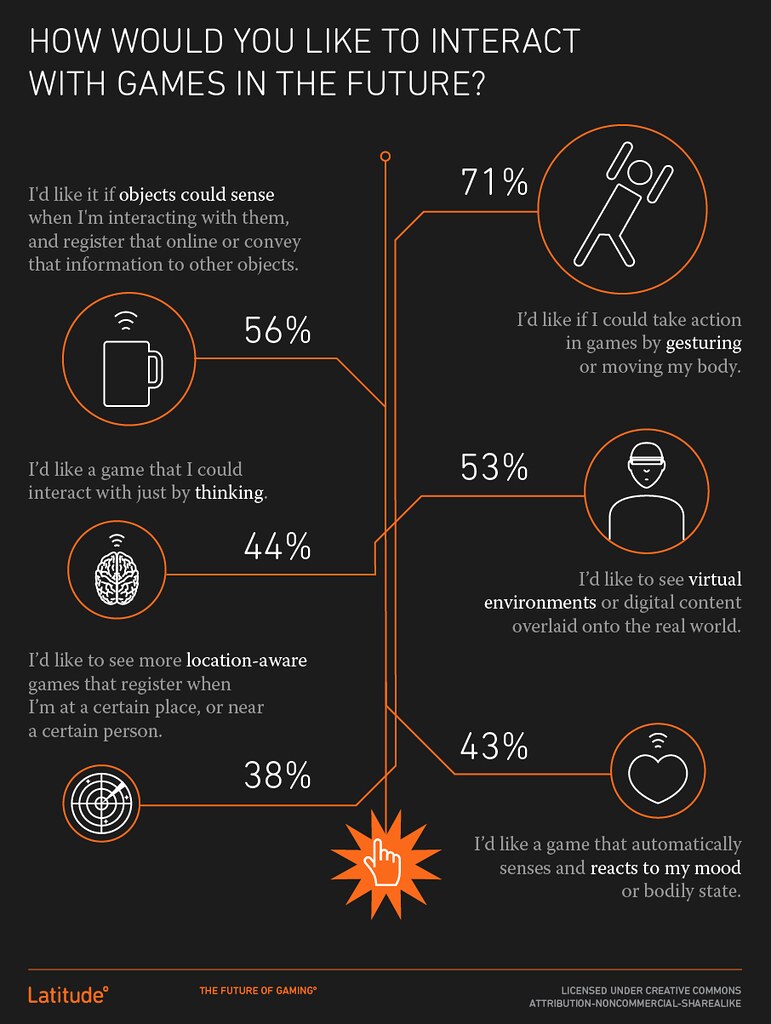
Of the many hobbies one might have overlooked in the past, playing video games is one activity that will soon become unavoidable. Current demands in gaming are directing developers to create games that help us interact with our environment in real-time, seamlessly integrating technology into our lives.
In a recent study by Latitude Research, a group that “provides creative research and unexpected knowledge for leaders in content, technology and learning”, senior research analyst Natalie Stehfest believes that “Everyone will be a gamer. The gamers of tomorrow won’t be limited by platform or location…The world around us will become the ultimate playing field.”
While some might find that statement tough to swallow, we are already seeing video games popping up in our daily lives. Grandparents are playing Wii Tennis and kids are throwing frisbees through PlayStation Sports Champions. Online gaming connects players from around the globe, enabling family and friends to interact in collaborative, stimulating and entertaining ways.
Survey says …
After surveying 290 smartphone owners between the ages of 15 – 54–all of whom self-identified as at least “casual gamers,” with nearly half labeling themselves as “game enthusiasts”– Latitude Research was able to summarize the future of gaming in three main points:
- Games are going beyond the screen.
- Life is becoming play.
- Social is maturing into Societal.
Latitude Research now believes that “the stereotype of the reclusive gamer is outdated. These days, games are everywhere, and gamers are social, tech-savvy, goal-oriented people with a real drive to improve themselves and the world around them.”
In addition to generally just wanting to have a bit of fun, 56% of those surveyed agree that they are using gaming to socialize and meet new people, while 47% hope to achieve personal goals through gaming. Of these gamers, the majority prefer smartphones for gaming, leaving them untethered and able to socialize through the activity.
These “new gamers” are social, thoroughly engaged with the “offline” world, and exceedingly goal-oriented. These players are the sort that hope to improve themselves and, by association, impact society in a positive way.
Neela Sakaria, Senior Vice President of Latitude, says, “Profiling dynamic user groups like ‘the new gamers’ gives us a window into how companies can not only develop meaningful tech experiences today but, more excitingly, grasp opportunities that are just on the horizon.”
What do new gamers expect in the future?
New gamers are eager to see games go beyond the screen and easily merge “online” with their “offline” lives. For example, video games (while once constrained to a static controller) are now capable of motion-sensing without handheld remotes (ie. Microsoft XBOX 360’s Kinect) and engaging players with “real” activity.
- 95% of surveyed players are enjoying games that combine digital content with the real, physical world, and Latitude believes that future games are moving in the direction to include “using a player’s location, mood or stress level as metrics in a game, or allowing players to overlay virtual environments or information onto their actual surroundings, as with augmented reality.”
- 92% of these gamers hope to see more “life games” — the sort that help them achieve personal goals like eating healthy, working out, learning about science, or completing household chores. We’ve already seen these types of games in iOS apps like GymFu and Epic Win, both applications that turn otherwise mundane activities into fun, competitive or entertaining experiences.
- 96% of those surveyed are interested in seeing games that help impact the world in a positive way, or involving themselves in social experiences that make activities more “game-like”. For example, gamers are more likely to meet up with neighbors for “social adventures” like community scavenger hunts while forming teams, etc.
The future is gaming.
While some may have originally believed that video game players are the sort to be confined to the dark cave of their room, wasting away while society evolves past and around them, these new gamers are instead defying the social stereotypes of the past. New gamers are actively social and eager to interact with their neighbors and environment through gaming.
For companies and brands, this emerging demographic represents a large market that is more eager to engage their products or services through more entertaining means. For society as a whole, these new gamers are looking to connect with each other through positive experiences shared through gaming.
How do you see games impacting our lives in the future, and how are games affecting your life today, if at all? Let us know.
Get the TNW newsletter
Get the most important tech news in your inbox each week.







